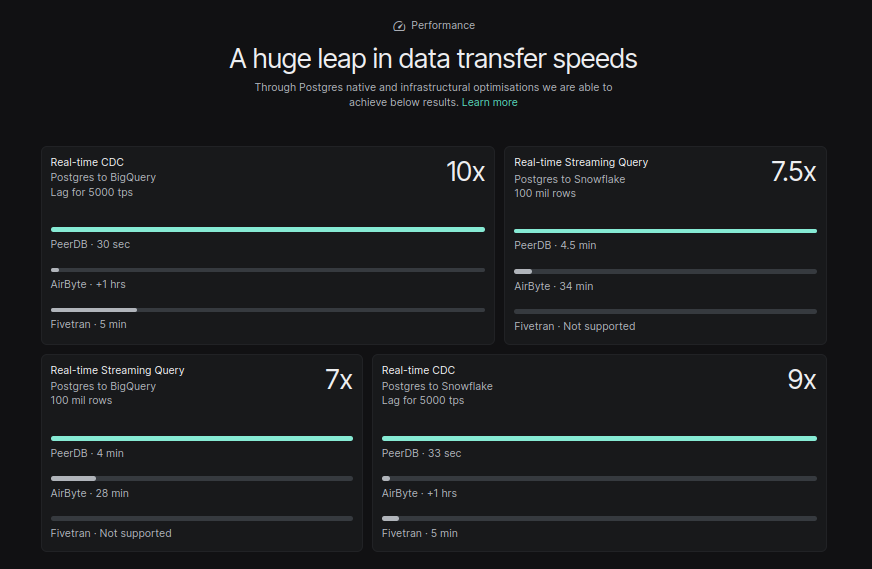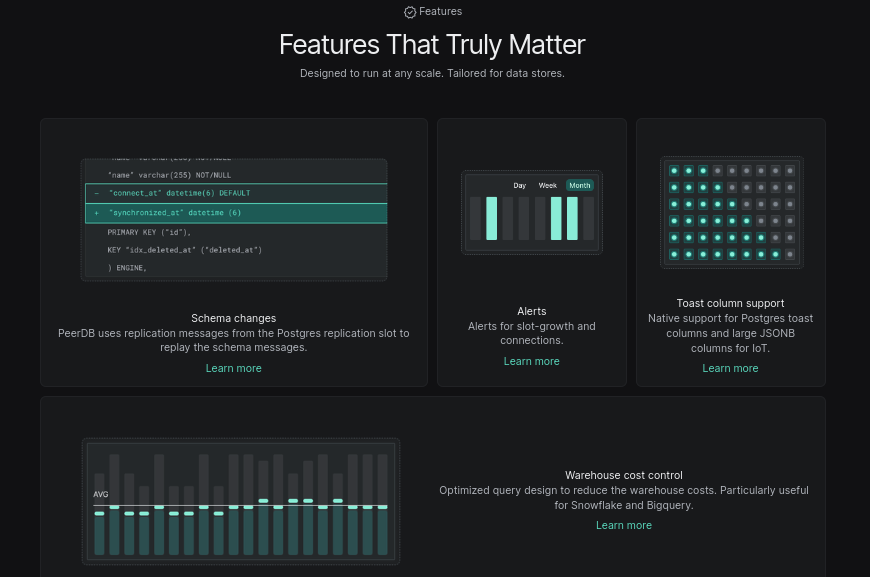 BIG DATA
BIG DATA
 BIG DATA
BIG DATA
 BIG DATA
BIG DATA
Startup PeerDB Inc., which has built a data movement platform specifically for open-source PostgreSQL database management systems, said today it has closed on a seed funding round worth $3.6 million.
Leading the investment was 8VC, and it was joined by Y Combinator, Wayfinder Ventures, Webb Investment Network, Flex Capital, Rogue Capital, Pioneer Fund, Orange Collective and several angel investors.
PeerDB says its data movement platform is designed to improve on the capabilities of existing data pipelines that were never designed for Postgres databases. Existing data movement and extract, transform and load or ETL tools often prioritize the sheer number of connectors they can offer ahead of the quality of those connectors.
As a result, most data connectors today are extremely inefficient, the startup claims. For instance, users have to deal with issues such as slow synchronization, which can take days when dealing with gigabytes of data. Existing connectors are also unreliable, the startup says, and they have limited features, with no ability for end users to configure them for different types of data.
The startup said it’s distinguished primarily by the quality of its connectors for Postgres databases, and it believes it’s delivering its product at a critical time. Currently ranked fourth in the DB-Engines global ranking of database management systems, Postgres is rapidly gaining in popularity with developers. It was notably named as DB-Engines’ DBMS Platform of the Year award winner in 2023, in recognition of its rapid growth, which outpaced all of the 416 other systems it monitors.
PeerDB co-founder and Chief Executive Sai Krishna Srirampur said Postgres is becoming the de facto primary database at thousands of enterprises and smaller businesses. “[But] existing data movement and ETL tools are not built for Postgres,” he said. “They often fail at scale due to painfully slow syncs, lack of reliability and lack of native features. The time has come for someone to give enough care to the world’s most adopted open source database.”
The startup says the launch of its data movement platform is timely, not only because of Postgres’ growing adoption, but also because of the intense interest in artificial intelligence technologies and hyperscale data analytics. They can require massive amounts of data to be moved from primary platforms such as Postgres to data warehouses that feed AI models.
PeerDB said its tool relies on a technique called “parallel snapshotting,” which it said is the most rapid way of moving Postgres data. With this technique, it can reduce the time needed to move massive datasets from days to just hours, with superior consistency, it said.
In addition, its tools have the ability to natively replicate advanced data types such as JSONB and geospatial data, which is critical for distributed internet of things applications. By making this data available in its native format, it becomes immediately accessible to AI-based analytics tools.
Additionally, PeerDB claims its data modeling and infrastructure optimizations can reduce data movement costs by up to five times compared with existing ETL tools.

PeerDB says its mission is to become the go-to platform for Postgres data movement, explaining that its technology provides many advantages over existing tools. Among its claims, it says its platform enables faster and more cost-effective replication from Postgres to data analytics warehouses such as Snowflake, BigQuery and Clickhouse for AI analytics and training workloads.
Furhemore, PeerDB says it can support real-time streaming and change data capture from Postgres to tools such as Apache Kafka, Google PubSub and Azure Event Hubs. This enables new use cases such as real-time alerting, it said.
Other use cases include database migrations from legacy systems such as Oracle and SQL databases, ensuring high availability and backups for Postgres databases, and Vector ETL. That last is the process of extracting unstructured data at scale and transforming it into vector embeddings that can be read more easily by large language models that power generative AI applications.
PeerDB’s other co-founder, Chief Technology Officer Kaushik Iska, explained that existing Postgres data movement technologies lack optimizations such as parallel snapshotting and the ability to handle the nuances around data replication slots. “We’re focused on building a system specialized for Postgres at terabyte scale,” he said. “Our approach diverges from traditional methods that falter at scale and resort to resyncs. Our team of Postgres experts not only provides data movement services but also becomes an essential part of client teams, offering advice on database tuning and query optimization.”

To support its claims, the startup showcased a number of early adopters of its platform, They include Harmonic AI Inc., which replaced its incumbent ETL tool with PeerDB and realized savings of almost $80,000 per year on data movement costs.
Fiber AI Inc. also said it used PeerDB to replicate terabytes of data from Postgres to ClickHouse in real-time in order to power its real-time search features. Meanwhile, Flatiron Health Inc. used the platform to migrate 35,000 tables, amounting to terabytes of data, from Postgres to Snowflake, in less than one week.
Constellation Research Inc. analyst Holger Mueller said data movement has only recently taken on greater importance in the last couple of years as cloud computing and AI technologies have increased in popularity, leading to greater demand for something faster.
“More enterprises than ever need to move their data from cloud databases to their applications, and with the push for AI, they also need to shift data from the cloud to their GPUs,” Mueller said. “So enterprises will welcome any innovation that makes it faster and easier to access the information in Postgres databases, which are very popular. It’s good to see this innovation led by the startup field, and it bodes well as PeerDB is led by very experienced database professionals.”
Looking forward, PeerDB intends to use the funds from today’s round to build up its engineering team and accelerate its go-to-market strategy to support its growth. At present, it says its revenue is doubling every two months as it continually adds new customers.
8VC Partner Bhaskar Ghosh said it’s investing in PeerDB because it believes Postgres is on the path towards widespread enterprise adoption. “We see an exceptional team in Sai and Koushik, whose deep expertise in Postgres positions them uniquely,” he said. “We believe that a solid narrative around data movement and ETL will play a pivotal role in the success of Postgres.”
Support our mission to keep content open and free by engaging with theCUBE community. Join theCUBE’s Alumni Trust Network, where technology leaders connect, share intelligence and create opportunities.
Founded by tech visionaries John Furrier and Dave Vellante, SiliconANGLE Media has built a dynamic ecosystem of industry-leading digital media brands that reach 15+ million elite tech professionals. Our new proprietary theCUBE AI Video Cloud is breaking ground in audience interaction, leveraging theCUBEai.com neural network to help technology companies make data-driven decisions and stay at the forefront of industry conversations.